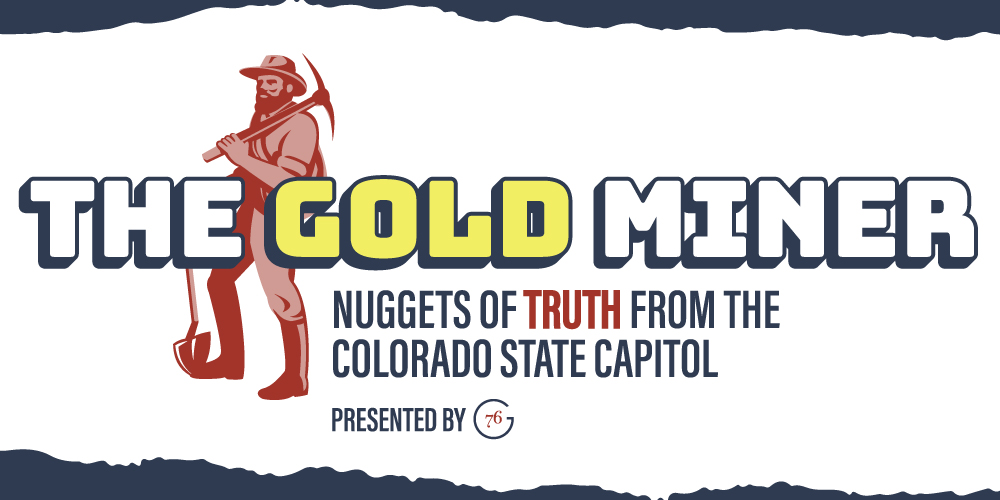
★ THE MOTHER LODE ★
A short, sweet, and rich summary of what’s happened at the Capitol
Sine Die!
It’s seemed like a marathon these last few weeks of the session, with early mornings turning into late evenings every day. In the end, however, some notable developments took place, like an agreement on oil and gas and a last-minute property tax law that was introduced three days before sine die.
It has been an honor to keep you updated during this session. Even though the current legislative session is over, our work is not. The Gold Miner newsletter will retire until the start of next session, but keep an eye out for some new political and policy nuggets in our new monthly newsletter which debuts at the end of this month.
Drilling for Deals
A settlement reached by industry, Gov. Polis and environmentalists shelved a drilling ban and more stringent permitting requirements, allowing the oil and gas industry to continue operations. Two bills, SB24-229 and SB24-230, emerged from that settlement. The former aims to cut Colorado emissions of NOx from operations by 50%, and increases enforcement authority, broadens the mitigation effort for orphaned wells, and requires oil and gas operators to seek a license to reduce NOx emissions. SB230 mandates that all Colorado oil and gas producers begin paying a quarterly production fee for clean transit on July 1, 2025. The proceeds will be divided as follows: 70% go towards funding local transit operations and service expansion, 10% for funding the local transit grant program, and 20% to funding passenger rail projects and services through the rail funding program.
Colorado’s Property Tax Deal Takes Center Stage
Bipartisan property tax reform SB24- 233 passed both House committees and was approved on the floor with just one day remaining in the session. Both residential property assessments and commercial property assessment rates are steadily decreased under the bill. Beginning in 2025, it makes changes to the residential property valuation assessment system. Though referred to as a “responsible alternative” to possible ballot initiatives, the bill does not create new budget stabilization measures or draw from TABOR surplus funds.

The 76 Group lobbying team in the final week of the 2024 legislative session.

★ THE BILLFOLD ★
Updates on impactful legislation
Senate Bill 24-229
Ozone Mitigation Measures
By: Senators Winter, Priola
Status: Passed both chambers with amendments.
Summary: This bill seeks to reduce oxides of nitrogen (NOx) emissions from oil and gas operations in Colorado by 50% by 2030 compared to 2017 levels. It removes limitations on temporary restraining orders and preliminary injunctions in enforcement actions and clarifies the division’s authority to impose civil penalties for violations.
Senate Bill 24-230
Oil and Gas Production Fees
By: Senators Fenberg, Cutter
Status: Passed both chambers.
Summary: The fee amount is determined based on the average natural gas and oil spot prices calculated by the energy and carbon management commission and published on their website. The clean transit enterprise sets the fee amounts accordingly, consulting with the commission before finalizing them. Producers must file a return and pay the production fee to the Department of Revenue by the last day of the second month following each calendar quarter.
Senate Bill 24-233
Property Tax
By: Senators Hansen, Kirkmeyer
Status: Passed both chambers with amendments.
Summary: The law places a cap on the amount of money local governments can receive from specific property taxes starting in the 2025 property tax year. Certain entities, like home rule local governments, school districts, and those that do not require voter approval to collect money above the statutory 5.5% property tax revenue maximum or disregard constitutional constraints, are exempt from this limit. The cap is calculated by adding 5.5% to the base year eligible property tax income of the local governmental entity for each year that has passed since the base year, inclusive of the pertinent property tax year.
Senate Bill 24-141
Out-of-State Telehealth Providers
By: Senators Van Winkle, Michaelson Jenet
Status: Passed both chambers.
Summary: The bill allows a health-care provider (applicant) who possesses a license, certificate, registration, or other approval as a health-care provider in another state (out-of-state credential) to provide health-care services through telehealth to patients located in Colorado if the applicant registers with the regulator that regulates the health-care services the applicant will provide (regulator).

Insights by Meghan Graf, VP of Strategic Communications, 76 Group
The 2024 session is over. Here’s why you should already be planning for 2025.
Have you ever had a friend who pops up once a year to check in and then vanishes again, as if they’ve fulfilled their annual catch-up obligation? No one likes that friend. In fact, it’s an unfortunate experience most of us have shared. It makes it impossible to cultivate a real, lasting friendship that grows and evolves over time. And, inevitably, when that friend calls to check in the next year, you’ll spend time trying to find common ground instead of building upon the real foundation of your relationship.
The same thing happens when the legislature and stakeholders go their separate ways at the end of session.
I know what you’re thinking—“friendship” and “state legislature” aren’t two terms that you’d normally associate with one another, especially in this day and age. And it’s not about friendship per se, but the same sentiment applies. If you close up shop on your public affairs efforts until later this year or even early next, you’ll become that friend —not just to legislators but also to stakeholders, the media, your best advocates and more. Continued outreach and engagement is needed to ensure you’re set up for success next year. Stay present, relevant, and informed year round to create the biggest impact.
Here are three ways you can get a head start on the 2025 session to make sure your issues and relationships are getting stronger with time and attention:
Plan, plan, plan (but expect it to change) : As the famous fictional race car driver Ricky Bobby once said, “if you ain’t first, you’re last.” Sit down with your internal and external partners and map out a 360-degree plan for what continued engagement looks like heading into 2025 session. Think about what went well during this session and what could be improved upon. The sooner you can do this, the better equipped you’ll be.
Show your stakeholders some love: Establish a regular communications cadence with stakeholders, advocates, legislators and the media. Make sure they’re up to date on the issues your organization cares about and the road ahead so they can be easily activated, and you don’t have to waste valuable time catching up. Baseline education and awareness will help your issue break through a notoriously crowded space.
Keep your finger on the pulse: News never sleeps. While you’re monitoring industry trends in the non-legislative season, there is tremendous value in monitoring and dissecting political news and trends in Colorado, other states and nationally. Information is power and can help provide context for inevitable adjustments to your plan.
Get a head start on 2025 – it’ll be here before you know it!

★ BUDGET BONANZA ★
All that’s happening with the Joint Budget CommitteeA $67 million tax rebate that Colorado taxpayers were entitled to was discovered by lawmakers as a result of a calculation error for the state’s reinsurance program. After the governor approved the budget for the upcoming fiscal year, this error was found, and lawmakers are now frantically trying to find a remedy. Due to a misreading of premium tax payments, money was incorrectly excluded from TABOR computations. In order to address the issue, legislators are considering stopping premium tax transfers as well as possibly using the state’s general fund reserve. Legislators are still optimistic that a solution will be found before the session closes, despite their displeasure with the lack of prompt communication over the matter.
★ CAPITOL CHATTER ★
Press releases, news articles, and more
News Story – May 2, 2024 – Colorado Politics
Colorado taxpayers are owed $67 million in refunds, a mistake lawmakers are scrambling to fix | Legislature
News Story – May 2, 2024 – The Sum & Substance
Grand deal or “Faustian bargain”? Compromise oil-and-gas bills move forward.
News Story – May 2, 2024 – The Colorado Sun
An error shorted Colorado taxpayers $34M in refunds. Here’s why.
News Story – May 2, 2024 – The Denver Post
Northglenn filing ethics complaint against Colorado state Sen. Faith Winter (denverpost.com)

